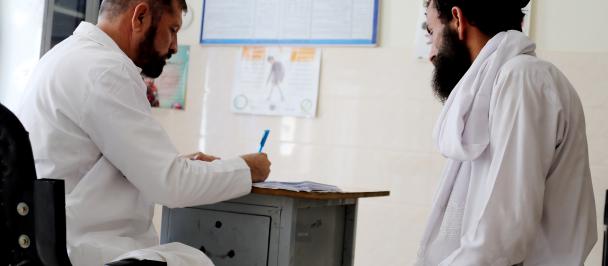A student on a UNDP/Global Fund-supported project to train women nurses for work in rural Afghanistan fills prescriptions at Beland Ghar Community Health Centre. Photo: Omer Sadaat / UNDP
In a very ordinary hostel in Jalalabad, something extraordinary is going on. A young woman is sitting on her hostel bed, bent over a textbook.
This is Abida and she is training to be a nurse in a country where most women haven’t even finished primary school.
Abida has just finished a long day of classwork and on-the-job training. She’s exhausted, but determined to carry on because nurses are hard to find in her home village, more than 100 kilometres away in Nuristan. In this isolated province, woman commonly die because basic healthcare is unavailable – either because there are no doctors or because women are not allowed to be treated by a man. Thinking about this situation keeps Abida going when her eyes are heavy and her brain numb.
Abida’s 33 classmates feel the same. They are all from Nuristan and will go home when they finish training. Doctors and nurses from outside are afraid to work there. Go on the wrong day or at the wrong time and you’ll need medical attention yourself. The only solution is to train local people to fill the gap.
The school has been set up by UNDP and the Afghan Ministry of Public Health, with funding from the Global Fund. In addition to two years of medical training, students receive accommodation, transportation, three meals a day and a nominal living allowance. For Afghanistan, which has some of the highest maternal and child mortality rates in the world, this small investment will reap a huge return.
After studying in class, students are sent in groups to practice their skills in city hospitals.
“Please pass me those scissors and some bandages,” Abida calls out to her friend, who is helping to stitch up a patient’s hand. She cleans the cut, numbs the area, makes some stitches, and then dresses it properly – exactly the kind of basic surgery Abida and her fellow nurses will have to perform back in their village clinics.
They will also pass on important advice to keep women and children healthy. “When I see a pregnant woman in the clinic,” says Abida, “I’ll advise her to eat a balanced diet… and properly breastfeed her baby.”
It’s not an easy course, but in some ways, enrolling was harder than the actual study. In the places where these women come from, discrimination is still the norm and young women are not supposed to live or study away from home.
At first, Abida’s family didn’t want her to enroll. “My parents were very worried about how I could live away from them,” she recalls. “But for months I fought back hard until I convinced my father to give me the green light.”
Abida’s older brother even left home in protest. “He argued that as a woman I wouldn’t be able to protect myself,” she says. “And that the local insurgents would harm us if they found out.”
But the wider community is more supportive. Abida has already made herself popular by returning home during the weekend to help give IV drips to sick children.
The school in Jalalabad is just one of six set up by UNDP/the Global Fund across the country. These are training more than 200 nurses. When the first class graduates in a couple of months, these fresh nurses will return to some of the most disadvantaged parts of Afghanistan, where they will not only be lifesavers but also role models.
UNDP has been selected as the Principal Recipient for four Global Fund grants: TB, health system strengthening, HIV/AIDS and malaria. Our work to support the provision of public health services in these areas includes advocacy, education and technical support for better diagnosis, treatment and associated care so that patients can enjoy empowered and dignified lives.

 Locations
Locations









